Casa Bundle
Who Really Owns Casa Company?
Understanding a company's ownership is crucial for investors and strategists alike. The story of CASA A/S, a prominent Danish construction firm, offers a compelling case study in how ownership shifts can reshape a business. From its founding in 2006 to its current structure, the evolution of Casa Company ownership reveals key strategic decisions and financial influences.
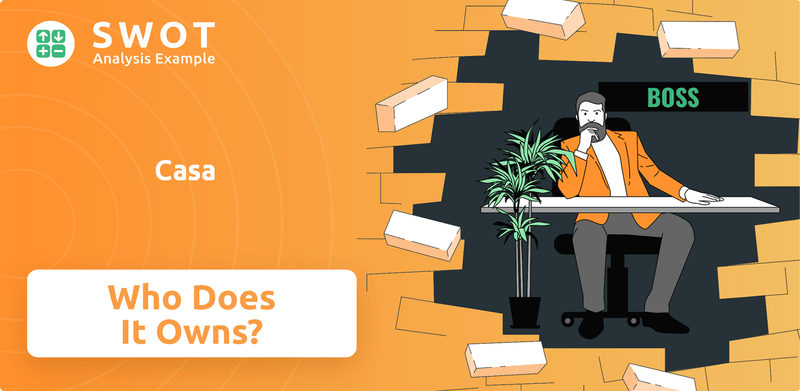
This analysis will explore the Casa SWOT Analysis, diving deep into the Casa Company history to uncover who owns Casa Company and the implications of this ownership. We'll examine the Casa Company owner's impact on its strategic direction, from its founder-led beginnings to the influence of major shareholders and the board of directors. Discover the Casa Company's corporate structure and how its leadership has navigated the complexities of the construction industry.
Who Founded Casa?
The company, CASA A/S, began its journey in 2006. It was founded by Michael Mortensen, Per Hansen, and Peter Rosengreen. These individuals played key roles in the company's early days, shaping its direction and establishing its foundation. Understanding the Brief History of Casa is essential to grasp the evolution of its ownership.
Even after significant changes in ownership, the founders maintained their involvement. This continuity in leadership suggests a strong commitment to the company's vision. Michael Mortensen, Per Hansen, and Peter Rosengreen's continued presence indicates their lasting influence on the company's trajectory.
In 2016, CataCap acquired a 60% stake in the company. Despite this, the founders retained a substantial minority share. Michael Mortensen remained as Executive Chairman of the Board and CEO, Per Hansen as CFO, and Peter Rosengreen as COO. This partnership was a strategic move to facilitate further growth.
The core team consisted of Michael Mortensen, Per Hansen, and Peter Rosengreen.
The exact initial equity split among the founders is not publicly detailed.
CataCap acquired a 60% stake in 2016.
The founders remained in key management positions.
The partnership with CataCap aimed to facilitate growth and scalability.
The founders retained a significant minority share after the CataCap investment.
The early years of the company were marked by the strong influence of its founders. The decision to partner with CataCap in 2016 was a strategic move to facilitate growth. The founders' continued involvement in leadership roles highlights their commitment to the company's success. Understanding the Brief History of Casa provides a deeper insight into the company's ownership structure and its evolution over time.
- Michael Mortensen, Per Hansen, and Peter Rosengreen founded the company in 2006.
- CataCap's investment in 2016 marked a significant change in ownership.
- The founders maintained key leadership positions and a substantial minority share.
- The partnership with CataCap was aimed at enhancing scalability and growth.
Casa SWOT Analysis
- Complete SWOT Breakdown
- Fully Customizable
- Editable in Excel & Word
- Professional Formatting
- Investor-Ready Format
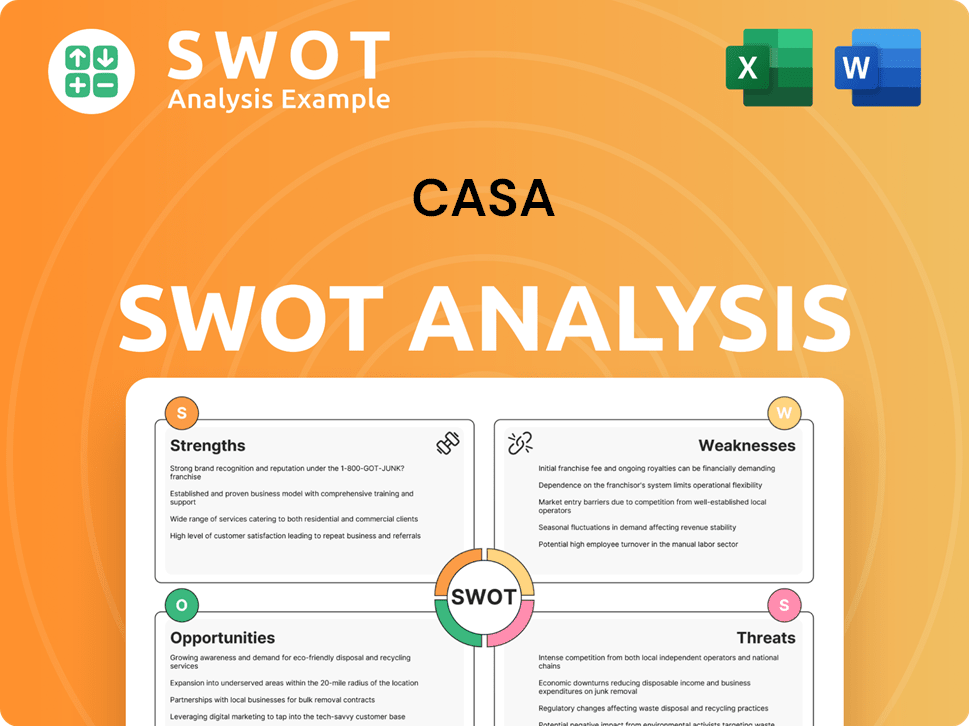
How Has Casa’s Ownership Changed Over Time?
The evolution of Casa Company ownership reflects significant strategic shifts and investment decisions. Initially, the founders, Michael Mortensen, Per Hansen, and Peter Rosengreen, held a significant stake in the company. In 2016, the Danish private equity fund CataCap acquired a 60% stake in CASA A/S, marking a pivotal change in the company's ownership structure. This move was based on CASA A/S's strong financial performance, with a turnover of DKK 1.1 billion and DKK 86 million in earnings before tax in 2015. The founders remained in management, maintaining a minority shareholding.
A notable transition occurred in July 2021 when ActivumSG, a British private equity firm, acquired CASA A/S from CataCap Management. This acquisition by ActivumSG's Fund VI further shaped the Casa Company owner profile, solidifying the private equity ownership model. By 2021, CASA A/S had expanded to over 250 employees and aimed for a turnover exceeding DKK 3 billion (approximately €400 million). Furthermore, over 15% of CASA A/S was owned by its employees, highlighting a degree of employee shareholding alongside the private equity ownership. These ownership changes supported CASA A/S's growth and investments in sustainable construction, targeting at least 95% of its construction to be sustainability certified by 2023.
| Year | Ownership Change | Impact |
|---|---|---|
| 2016 | CataCap acquires 60% stake | Shift to private equity ownership, initial scaling. |
| 2021 | ActivumSG acquires CASA A/S | Further consolidation of private equity ownership, accelerated growth. |
| 2021 | Employee Shareholding | Increased employee engagement and alignment with company goals. |
Understanding the Casa Company history reveals a strategic focus on growth and sustainability. The company's ownership has evolved to support its expansion and commitment to sustainable practices. This evolution has enabled CASA A/S to become a leading property developer and turnkey contractor in Denmark. For more details on how the company has grown over time, check out the Growth Strategy of Casa.
The ownership of CASA A/S has been primarily driven by private equity firms, with significant changes over time. The founders initially held a major stake, but private equity firms have since taken over. Employee ownership has also played a role, indicating a commitment to employee engagement.
- CataCap initially acquired a majority stake.
- ActivumSG later acquired the company.
- Employee shareholding is also a factor.
- The company has focused on growth and sustainability.
Casa PESTLE Analysis
- Covers All 6 PESTLE Categories
- No Research Needed – Save Hours of Work
- Built by Experts, Trusted by Consultants
- Instant Download, Ready to Use
- 100% Editable, Fully Customizable
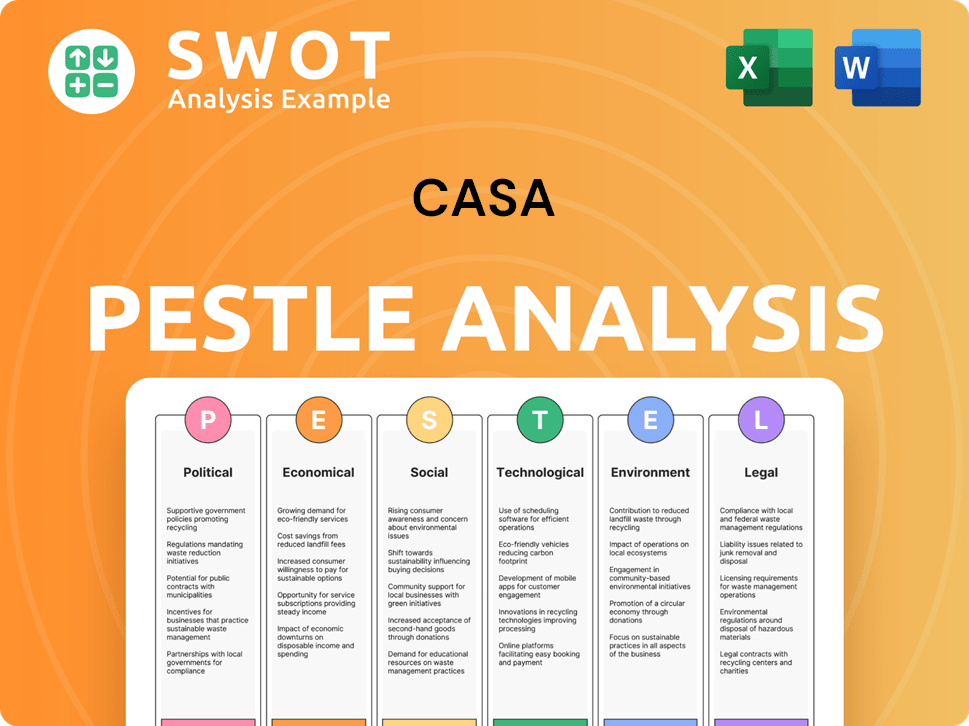
Who Sits on Casa’s Board?
Determining the current board of directors for the company requires reviewing the latest corporate filings and announcements. After the acquisition by CataCap in 2016, the board composition likely changed to include representatives from the private equity firm alongside the founders. This shift in leadership is a common occurrence following a change in Casa Company ownership, as new owners often install their own management teams to align with their strategic goals.
The exact details of the current board, including individual shareholdings and voting power, are not readily available in general public information. However, it's typical for private equity firms to secure significant representation on the board to influence strategic decisions. Michael Mortensen, a co-founder, held the Executive Chairman position post-CataCap acquisition, indicating continued founder influence. The Casa Company owner structure is designed to ensure that the major shareholders have a strong say in the company's direction.
| Board Member | Role | Notes |
|---|---|---|
| Michael Mortensen | Executive Chairman (Post-CataCap) | Co-founder, indicating continued founder influence. |
| CataCap Representatives | Board Members | Likely included after the 2016 acquisition. |
| ActivumSG Representatives | Board Members | Likely included after the acquisition. |
Private equity firms like CataCap and ActivumSG usually structure their investments to ensure control proportional to their ownership stake. The governance structure of the company, including the board's composition and voting rights, is designed to reflect this. Understanding the Casa Company leadership is crucial for anyone looking to understand the company's strategic direction and decision-making processes. This helps clarify who owns Casa Company and how they exert control.
The board of directors is likely composed of representatives from the private equity firm and the founders.
- Major shareholders, like CataCap and ActivumSG, have significant representation on the board.
- The voting structure is designed to give major shareholders control.
- Michael Mortensen, a co-founder, maintained influence as Executive Chairman.
- Changes in the board reflect shifts in Casa Company history.
Casa Business Model Canvas
- Complete 9-Block Business Model Canvas
- Effortlessly Communicate Your Business Strategy
- Investor-Ready BMC Format
- 100% Editable and Customizable
- Clear and Structured Layout
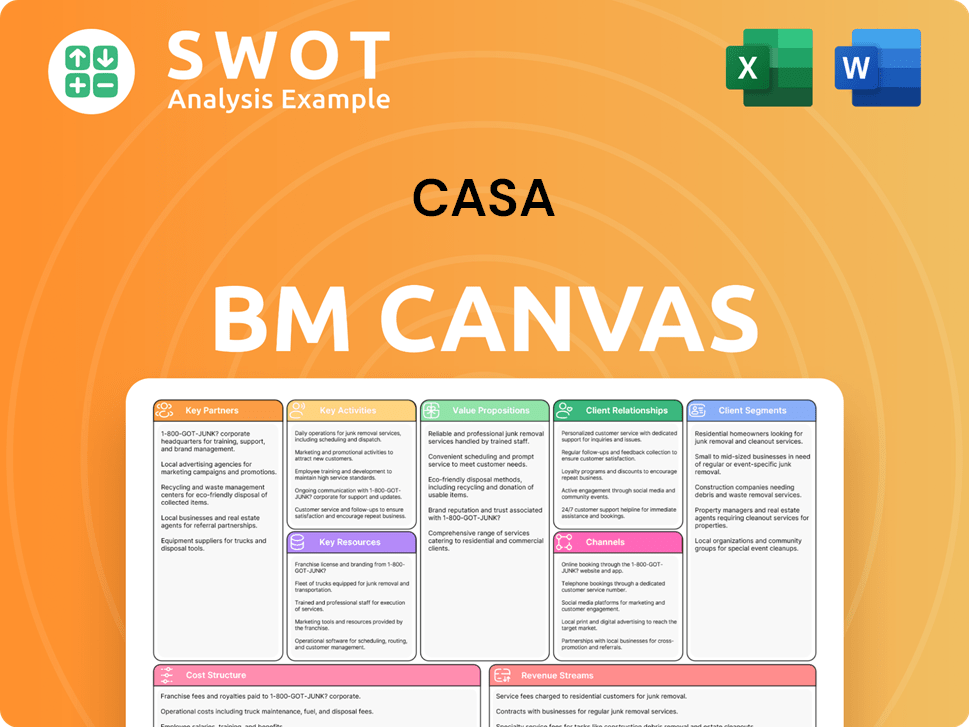
What Recent Changes Have Shaped Casa’s Ownership Landscape?
The most significant recent development in Casa Company ownership was the acquisition by ActivumSG Capital Management in July 2021. This transaction marked a shift from one private equity owner (CataCap) to another. This type of secondary buyout is common in the private equity sector, where funds acquire companies to foster growth and optimize the business before a potential future exit. Under ActivumSG's ownership, Casa Company continued its focus on being a leading property developer and turnkey contractor in Denmark, emphasizing sustainability.
Casa Company aimed for a turnover exceeding DKK 3 billion in 2021 and committed to having at least 95% of its construction certified as sustainable by 2023. This commitment aligns with the growing industry trend of prioritizing environmental sustainability in construction and real estate. The Danish construction market saw a projected 2.5% decrease in 2024, but a recovery is anticipated in 2025, driven by increased demand for green building materials, which supports Casa Company's strategic focus.
Industry trends indicate a rising presence of institutional ownership and private equity involvement, especially in sectors like real estate and construction, due to the capital-intensive nature of projects and long-term growth opportunities. While specific share buybacks or secondary offerings by Casa Company itself aren't detailed for 2024-2025, the emphasis on growth and sustainability under private equity ownership suggests continued strategic investments. The focus on sustainable construction aligns with the broader market trend, as the demand for green building materials continues to rise, reflecting the company's commitment to environmental standards.
The current owner of Casa Company is ActivumSG Capital Management, following the acquisition in July 2021. This private equity firm took over from CataCap, another private equity owner. This change reflects the dynamic nature of ownership within the private equity landscape.
Casa Company's history includes a transition from CataCap to ActivumSG. The company has consistently focused on property development and turnkey contracting in Denmark. It has also emphasized sustainability, setting ambitious goals for green construction certifications.
Under ActivumSG's ownership, Casa Company's leadership continues to guide its strategic direction. While specific leadership details might vary, the focus remains on sustainable development and achieving financial targets. The company's focus is on the Danish market.
ActivumSG Capital Management currently owns Casa Company. This ownership structure is typical of private equity investments, where firms aim to enhance a company's value. Casa Company continues to operate with a focus on sustainable practices.
Casa Porter's Five Forces Analysis
- Covers All 5 Competitive Forces in Detail
- Structured for Consultants, Students, and Founders
- 100% Editable in Microsoft Word & Excel
- Instant Digital Download – Use Immediately
- Compatible with Mac & PC – Fully Unlocked
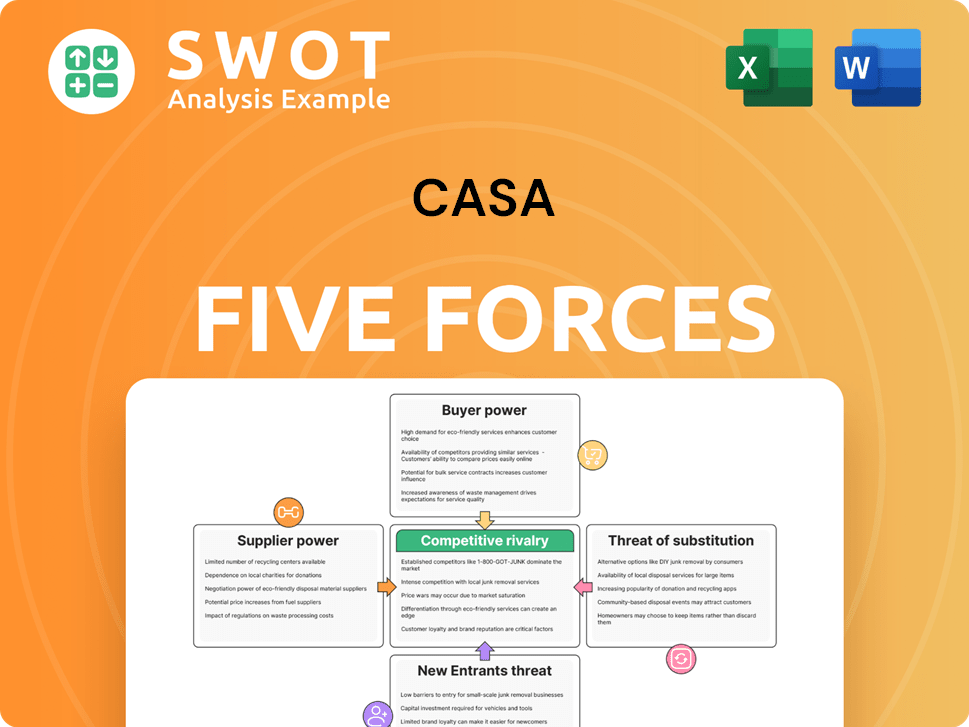
Related Blogs
- What are Mission Vision & Core Values of Casa Company?
- What is Competitive Landscape of Casa Company?
- What is Growth Strategy and Future Prospects of Casa Company?
- How Does Casa Company Work?
- What is Sales and Marketing Strategy of Casa Company?
- What is Brief History of Casa Company?
- What is Customer Demographics and Target Market of Casa Company?
Disclaimer
All information, articles, and product details provided on this website are for general informational and educational purposes only. We do not claim any ownership over, nor do we intend to infringe upon, any trademarks, copyrights, logos, brand names, or other intellectual property mentioned or depicted on this site. Such intellectual property remains the property of its respective owners, and any references here are made solely for identification or informational purposes, without implying any affiliation, endorsement, or partnership.
We make no representations or warranties, express or implied, regarding the accuracy, completeness, or suitability of any content or products presented. Nothing on this website should be construed as legal, tax, investment, financial, medical, or other professional advice. In addition, no part of this site—including articles or product references—constitutes a solicitation, recommendation, endorsement, advertisement, or offer to buy or sell any securities, franchises, or other financial instruments, particularly in jurisdictions where such activity would be unlawful.
All content is of a general nature and may not address the specific circumstances of any individual or entity. It is not a substitute for professional advice or services. Any actions you take based on the information provided here are strictly at your own risk. You accept full responsibility for any decisions or outcomes arising from your use of this website and agree to release us from any liability in connection with your use of, or reliance upon, the content or products found herein.